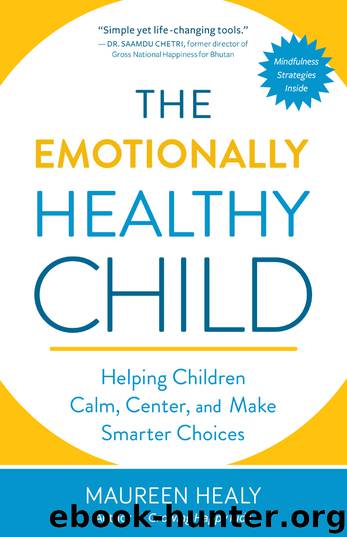The Emotionally Healthy Child by Maureen Healy

Author:Maureen Healy
Language: eng
Format: epub
Publisher: New World Library
The Age of Mindfulness
Children are uniquely suited to benefit from mindfulness practice. Habits formed early in life will inform behaviors in adulthood, and with mindfulness, we have the opportunity to give our children the habit of being peaceful, kind, and accepting.
DAVID GELLES
Boys and girls who learn how to slow down (mindfulness) versus speed up (mindlessness) are cultivating the capacity to make better choices. They are simply hardwiring their brain optimally earlier in life, which gives them the increased ability to regulate their emotions and demonstrate cognitive control (by choosing their thoughts, for example). Or as New York Times reporter David Gelles puts it: “Mindfulness, which promotes skills that are controlled in the prefrontal cortex, like focus and cognitive control, can therefore have a particular impact on the development of skills including self-regulation, judgment and patience during childhood.”
In other words, the parts of the brain that are trained by mindful strategies are the same ones that help your child cultivate emotional awareness and balance. Research shows, as we saw with Luis above, that children who participate in mindfulness strategies in the classroom are significantly more likely to display cooperative and pro-social behaviors.
While mindfulness doesn’t equal an emotionally healthy child, it does lay the foundation for a child to become aware and then make better choices. Adding practical wisdom (ideas) and tools (practice) to this formula accelerates the creation of the emotionally healthy mindset, which can help a child in her darkest days find the light.
Jeremiah, age eight, learned in the third grade how to take deep breaths to calm down, a very effective mindfulness tool. Before he began using this tool he often did things he later regretted, like pushing his friend on the playground or screaming at his mom during the morning drop-off routine. But with the addition of deep breaths, Jeremiah has been able to calm himself more often and not have as many outbursts.
What mindfulness tools like Jeremiah’s deep breaths do is create space between stimulus and response so that children can make smarter choices. When Jeremiah functioned on automatic, he screamed, pushed, and chose to react negatively, which didn’t help him or anyone else. But with the addition of mindfulness, he slowed down and began to see that he had more options (especially when he was challenged on the playground) for handling what was often problematic for him.
Download
This site does not store any files on its server. We only index and link to content provided by other sites. Please contact the content providers to delete copyright contents if any and email us, we'll remove relevant links or contents immediately.
| Allergies | Asthma |
| Autism & Asperger's Syndrome | Cystic Fibrosis |
| Down Syndrome | Eating Disorders |
| Epilepsy | Learning Disorders |
| Lice | Special Needs Children |
I Capture the Castle by Dodie Smith(1574)
Aspergirls by Rudy Simone(1362)
Be Different by John Elder Robison(1331)
Autism's False Prophets by Paul A. Offit(1240)
My Child's Different by Elaine Halligan(1230)
Smart but Scattered—and Stalled by Richard Guare(1194)
What's Making Our Children Sick? by Michelle Perro(1155)
101 Tips for the Parents of Boys with Autism by Ken Siri(1153)
Asperger Syndrome (Autism Spectrum Disorder) and Long-Term Relationships by Ashley Stanford(1114)
ADHD by Mark Selikowitz(1106)
An Adult with an Autism Diagnosis by Gillan Drew(1071)
Girlish by Lara Lillibridge(1069)
Nerdy, Shy, and Socially Inappropriate by Cynthia Kim(1055)
Animal-assisted Interventions for Individuals with Autism by Temple Grandin(1037)
On Immunity: An Inoculation by Biss Eula(1028)
Seeing Ezra by Kerry Cohen(1006)
Overcoming ADHD by Stanley I. Greenspan & Jacob (con) Greenspan(991)
Why Gender Matters by Leonard Sax M.D. Ph.D(982)
Sarah's Child (Hqn Romance) by Linda Howard(979)
